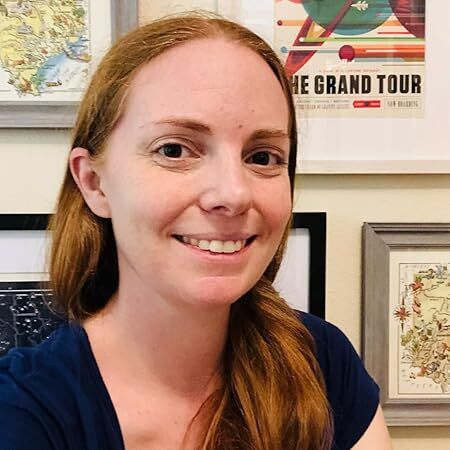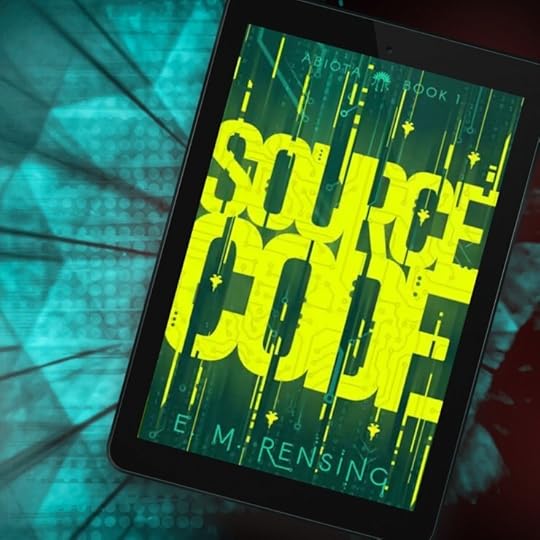Jim Talks Books with E. M. Rensing
 E. M. Rensing
E. M. RensingToday I’m chatting with E. M. Rensing, military science fiction author of The Heliosphere Trilogy and The Abiota Series. She graduated from the United States Air Force Academy in 2008, and enjoyed a 13 year career as a Cyber Operations Officer. Her military service took her around the world, from the bright lights of Asia to the depths of half-forgotten Air Guard bases. As a writer, she draws on her educational and technical background, as well as her experiences as an officer, to craft truly unique science fiction. When not writing, she enjoys sewing, theoretical physics, and raising the next generation of little readers. E.M. Rensing lives with her husband and daughters in south Texas.
What inspired you to start writing?
I’ve been writing since before I could write; I used to scribble pictures and narrate the stories to my mom. God bless her, she’d write it down for me. I have improved since then, though!
Do your personal experiences and background influence the themes and characters in your stories?
I’m an Air Force Academy graduate (Class of 2008) and served thirteen years as a Cyber Operations Officer in the Air Force. I worked some interesting assignments in that time, including 18 months at Space Command headquarters and four years as the cyber lead for an MQ-9 unit. I’ve also traveled all over the world, most of it on my own (albeit with a few crazy official military trips as well). All of that definitely comes into my work.
Oh wow! That’s a lot of life experience from which to draw. I imagine you’ve got memories that would sound like fiction to me.
Oh, it is so hard to keep direct personal experience out of it when I’m writing military characters! I have some absolutely insane stories from my time in the service, people I’ve worked with and things I’ve seen (and things I’ve done) that make for great starting points. But I’m not writing memoirs here; I want things to feel real, but characters and situations have to develop independently. I try to keep to the spirit of the people I served with.
What about other writers? Who are some of the authors or books that have influenced your writing?
Neal Stephenson was one of my favorite writers back in high school and college, and really showed me that you can have a very broad base of interests but still tell great stories. Peter Hamilton and William Gibson are some other writers whose work I love, along with Ursula K. LeGuin; I especially admire her spare, rich style. Lately I’ve been reading a lot of Warhammer 40K stuff; Guy Haley, Christopher Wright, and Dan Abnett are all legit top-notch writers. It’s a universe that allows for a lot of different stories to be told in different ways and those guys are very good at adapting their style and voice to the subject matter at hand. I find that inspirational.
Oh, I love me some Neal Stephenson, too. Cryptomonicon is such a wonderful combination of storytelling and World War II history. And Seveneves might be one of my favorite sci-fi epics.
What is your writing process like? Do you follow a specific routine or ritual when working on a new project?
I have little kids, so I do all my writing in the morning before they’re awake. I try to plot, but I also like to figure out the story and characters as I go. I always know the major characters’ arcs and the major story beats, but there’s a lot of wiggle room in there. I need that element of discovery in order to stay invested. I set word goals for myself (usually 10K per week) and deadlines with my editor to help keep me on track!
Ten thousand words a week is incredible, especially with kids. How are you spending that time at the moment?
I just finished up a super-fun military science fantasy retelling of The Nutcracker, Engines of Winter, which will be on Kickstarter later this month. I’m currently drafting a gaslamp fantasy novel (think Jules Verne meets Supernatural), set in 1880s Colorado. Very excited about both of those projects!
Ok, I’m dying to learn more about your Nutcracker retelling, but I’ll check out the Kickstarter since we’re here to talk about your latest series. Tell us about it. What should readers expect?
My current series that I’m rapid releasing, The Abiota Series, starts out with Source Code. The fifth book, Virch Code, comes out in September. It’s a near-future series where a grad student, a pilot and a military AI have to get to the bottom of a supposed alien first contact event. But the truth of it, and the reasons behind it, are far stranger than anyone imagined. It’s R-rated (language and violence), with plenty of mystery, action, and AI goodness. I go way beyond Asimov’s Three Laws with this one!
Oooh that sounds like my cup of tea. What was the initial spark or idea that led to the creation of this book?
One of the professional education classes I had to take for the Air Force a few years back was focused on future technologies. One of the things the military is putting a lot of scholarship against right now is the question of autonomous weapon systems (the fancy term for killer robots). I LOVED the discussions in that class, and it never really left my mind. It seemed like the perfect concept to explore for this series.
Interesting! Militarization of autonomous machines–reminds me of Kill Decision by Daniel Suarez, if you’re familiar. Can you introduce us to your main characters and their motivations?
There are three main characters. The central character, Daelia Hall, is a 26 year old who recently left her PhD program after a moral disagreement with her advisor. Now, she’s stuck working for her dad’s defense contracting firm, trying to figure her life out. When her dad goes missing and she’s asked to consult on a fallen UFO in his place, she gets drawn into the mystery. And if Daelia’s got a fault, it’s that she can’t let anything go.
The other main human character is Captain Jason “Argo” Irvington, a pilot who’s recently transferred into the Texas Air Guard from active duty in order to be closer to family. It’s a real culture shock for him, but he has to get his feet under him quick if he’s going to deal with all the crazy that’s about to break loose.
Then there’s Emily, one of the “abiota”, or artificial intelligences, in one of the unit’s MQ-9s. Emily is my absolute favorite; she’s got a huge personality and really loves her job of blowing stuff up. Maybe a little too much.
What’s the setting for this story, and why did you choose it?
I actually chose my last base for this story–all details changed for OPSEC purposes, I swear!–because it was the perfect place. Ellington Spaceport is a joint reserve base in Houston, Texas. I needed the military for the story, but I also really wanted to explore this world from a civilian perspective, and I just couldn’t do that in an active warzone on the other side of the planet. Space also figures in heavily and NASA has a lot of stuff out at Ellington. It was the right combination of elements.
Nice! Houston, Ellington, and Seabrook might not be as well known as Cape Canaveral or White Sands, but the area is a treasure trove of NASA gems. Lots of amazing work happens there folks rarely hear about.
Were there any particular challenges you faced while writing this book, and how did you address them?
Looking back, the MQ-9 was a challenging pick for a central airplane. I think it’s a cool plane, but I know that the general public might not view it with the same affection. Plus, from a practical perspective, they can’t do cool plane things like dogfight. But it was important to me to not use some bullshit fictional flying machine. At the same time, Emily had to be able to participate in the main action of the series.
One of the ways I made this happen was through the use of augmented reality that allows Emily. Another was through remote-control devices that a lot of abiota use, called kugutsu, or puppets, which really comes into play for Emily in later books in the series. I think she turned out awesome, and her physical limitations actually make the story more exciting.
I’m willing to bet the general fascination with unmanned aircraft is a great match for your choices, but I understand what you’re saying. I’ve got friends who’ve worked on F-14 Tomcats and they express a special love for that aircraft. Did you conduct any special research for this book? If so, what interesting facts or insights did you discover?
One of the crazy things about this series is that the whole AI thing blew up in the general awareness right as I was starting to work on it. I’d had some contact with it as a cyber ops officer, but not much. So I did a LOT of research on where we are with current technology, as well as what futurists are saying about where we can/should/must/will/won’t end up, thanks to AI. It was interesting to learn just how many flaws this tech has, and how easy it is to hack, if you’re willing to think outside the box.
Indeed, the topic of AI is pervasive, and misinformation and speculation abounds. I can’t wait to read your point of view on it! So, how does your latest book differ from your previous works in terms of style, tone, or subject matter?
The setting for this one is very different; it’s Earth, 2036. The technology available to play with is more or less a known quantity to readers. I wanted this start as grounded as possible so you really feel how the abiota have changed things. But there are also probably a lot of similar elements with The Heliosphere Trilogy as well, especially when it comes to the way I write the military. Normal people shoved into extraordinary situations, with no choice but to pull out a victory, no matter what it takes.
Nice! High stakes conflict! What emotions or thoughts do you hope readers will take away after finishing your book?
If anything, I hope it gets people to look at the concept of artificial intelligence in a different way. So many stories are either “AI is inherently murderous” or “humans are the real monsters” and I wanted to get out of that dichotomy. Because I just don’t think that’ll be how it will be.
Lovely. I agree with your sentiment, for what that’s worth. My background (cognitive science and technology) has taught me that “good” or “bad” apply to human choices, not technologies. Is there a favorite scene or moment from your book?
So I don’t want to get into spoilers, but there’s a moment in Virch Code when Daelia is at her lowest. Just captured by the guy who’s been hunting her all day, locked up, nowhere to run, no allies, no escape. Then comes help from the most unexpected of sources and with their intervention, all hell breaks loose. As fun as that all was, the emotional impact on Daelia is huge. She’s not a woman who likes to be vulnerable, but she’s about to have her world shattered and how she deals with it really defines her as a person to me.
Yeah well, as much as Daelia may not enjoy it, that sounds like amazing character development.
So generally speaking, who do you consider your ideal reader?
I write for people who want science fiction that’s curious about the future, who want to explore what-ifs and how-abouts in stories that don’t view that future (or us as people!) as hopeless. I think my readers like the spirit of the classics but are eager for something new.
Having read some of The Heliosphere Trilogy, I’d say you’re hitting that target dead center. Between your characters, settings, and action, you develop a great sense of “tentative wonder” that is the hallmark of classic science fiction. So, how do you engage with your readers?
Right now, my newsletter and Kickstarters are the best way I’ve found to interact. It’s hard! Email is great. I do try to respond to all my emails but it’s tough sometimes (did I mention I have toddlers?).
I hear you. So, what has been the most memorable feedback you’ve received so far?
My favorite message so far was from somebody who was angry at me for making space dangerous in my Heliosphere prequel short story. I thought that was an interesting thing to be upset about. But humanity’s attempts to deal with the dangers of long-term exposure to exo-atmospheric conditions is a major world-building element in that series, so it had to be in there!
Yeah but, space is… *checks notes*… extremely dangerous. Statistically speaking, everything in space will kill you. Oh, you know what, to each their own I suppose.
Any chance you’ll be engaging in book signings, readings, or virtual events where readers might find you?
My babies are finally toddlers, so I can finally dedicate some time to book signings! I’ve got a few events I’m going to here in Houston this fall, and hopefully, will be able to do some more in-person stuff next year.
That’s awesome! Hopefully folks reading this in and around Houston will check out the dates on your website and brave the traffic on 610 to say ‘hello.’ Really appreciate your time today, E. M.!
—

Check out SOURCE CODE, first book in The Abiota series !
To learn more about E. M. Rensing, her work, or her upcoming signing events, visit her website at https://www.rensingwrites.com. There, you can sign up for her newsletter and learn more about her ongoing Kickstarter campaign. You can also follow her on Facebook and Instagram.



